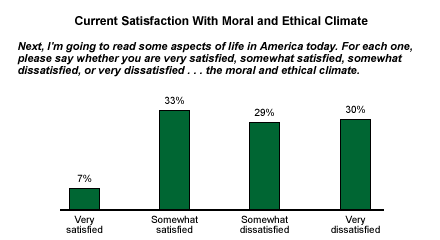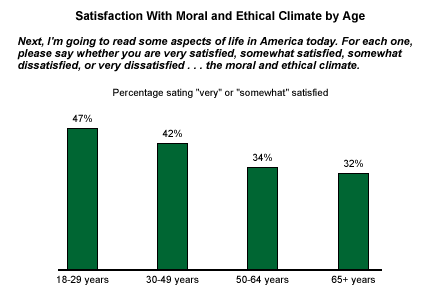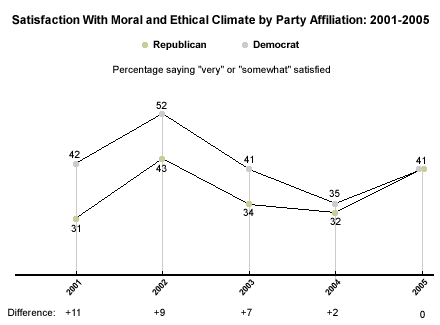The moral and ethical climate in the United States is uncomfortable for many Americans. Fifty-nine percent of Americans are somewhat (29%) or very (30%) dissatisfied with the United States' moral and ethical climate, according to Â鶹´«Ã½AV's annual Mood of the Nation poll*. Four in 10 Americans are very (7%) or somewhat (33%) satisfied.

What springs to mind when Â鶹´«Ã½AV asks Americans to assess the nation's "moral and ethical climate"? In follow-up interviews with some of the poll's respondents, the answers are diverse. Sexual and violent content in television and movies, prejudice, the economy, environmental waste, plagiarism in schools, corporate scandals, gay rights, and divorce are just a few of the topics that people associate with the moral and ethical climate in America.
Younger Americans Most Satisfied With Moral and Ethical Climate
The poll finds a gap in the way Americans of different ages assess moral conditions in the United States. Nearly half (47%) of the youngest adults, those aged 18 to 29, are satisfied with the moral and ethical climate in America, but satisfaction diminishes progressively with age, as it has since Â鶹´«Ã½AV began asking the question in 2001. Only a third (32%) of adults aged 65 and older are satisfied.

When explaining why he is "somewhat satisfied" with the moral and ethical climate in America today, an 18-year-old from Texas says, "Although I still think there is a lot more work to be done, I'm encouraged that the government has started to crack down on unethical business practices. And I am also glad Americans are beginning to accept gays as equals."
Contrast that relatively optimistic attitude with that of a 58-year-old man from Florida who is "very dissatisfied" with America's moral and ethical climate. "Corporations are not accountable for their actions; the bankruptcy laws are too lenient; too many credit cards are offered to people who can't afford to get into debt. It seems the more money you have, the more you can get away with in this country," he says. "No one's trying to help the average American anymore."
No Partisan Gap?
The November 2004 presidential election exit polls showed that among Americans who selected "moral values" as the top reason for their vote (22% of all voters), 80% voted Republican and just 18% voted Democratic (see "Moral Values Important in the 2004 Exit Polls" in Related Items). So it may surprise some that Republicans and Democrats are equally satisfied with the moral and ethical climate in America.
That wasn't always the case. In 2001, the gap between the two political parties was significant, with Democrats more satisfied than Republicans with morals and ethics in America. In 2001, 42% of Democrats were satisfied with the moral and ethical climate, compared with 31% of Republicans. That gap has narrowed each year and the latest survey shows 41% of both Republicans and Democrats are satisfied.

It is unclear why the gap between Republicans and Democrats has narrowed, and whether the current leadership in the White House has anything to do with it. Among the 7% of Americans who say they are "very satisfied" is a 63-year-old Republican from New Jersey. "I am so grateful to have a president who stands morally and ethically tall, and who shows the kind of leadership that we didn't always have in the past administration," she says. "Of course not everything is perfect in this country, but having moral leadership we can believe in sets the tone for the rest of us." A "very dissatisfied" 58-year-old Florida Democrat says his distress over the current Republican administration is probably driving his views.
Bottom Line
Opinion polls measure a complex set of attitudes based on individual experience. For instance, a 37-year-old black respondent from Florida who is "somewhat dissatisfied" with the moral and ethical climate is most concerned with the negative images of blacks on television, in the movies, and videos. "To me, that's immoral and unethical," the respondent says.
It's difficult to generalize about the diverse and often-personal reasons for Americans' assessments of something like moral climate -- but that doesn't make the aggregation of those views any less important. Americans have plenty of different reasons underpinning their views of the state of morality in the United States. Regardless of those underpinnings, Americans continue to be more dissatisfied than satisfied.
*Results are based on telephone interviews with 1,005 national adults, aged 18 and older, conducted Jan. 3-5, 2005. For results based on the total sample of national adults, one can say with 95% confidence that the maximum margin of sampling error is ±3 percentage points.
